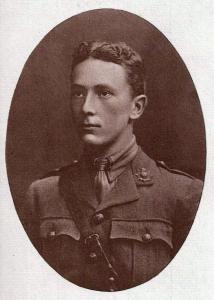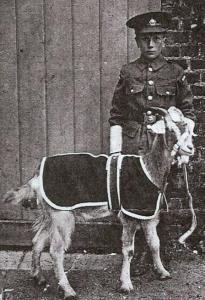
|

|
| Major Frank GOLDSMITH MC and Bar | |
|
14th (Service) Battalion Hampshire Regiment (1st Portsmouth) Date of birth: 27th December 1893 Date of death: 26th September 1917 Killed in action aged 23 Commemorated on the Tyne Cot Memorial Panel 88 to 90 and 162 |

|
| Frank Goldsmith was born at Blendworth, Catherington in Hampshire on the 27th of December 1893 the youngest son of James Goldsmith, a farmer and noted sheep breeder, and Eliza Jeanette (nee Gale) Goldsmith of "Old Blendworth", Horndean, Cosham in Hampshire. He was educated at Trafalgar House School, Winchester and at Lancing College where he was in News House from September 1905 to July 1911. He was a member of the Swimming VI in 1911 and was a member of the Officer Training Corps for four years where he became a Bugler and a Corporal. While at Lancing his photograph appeared in the magazine "Country Life" in 1909 along with the OTC mascot goat which was named "El Mahdi". The goat is thought to have been buried under a tree on the road up to Hanford House. He was a keen rider and fearless horsemen in the hunting field. When he was in his teens he rode in the International Horse Show. On leaving school he joined his brother, Fleet Goldsmith, an agricultural valuer from Petersfield, and soon after he qualified as an Associate of the Surveyor's Institute. Following the outbreak of war he was recruited at his offices at Portsmouth and applied for a commission in an application which was supported by a letter from his former head Master, the Reverend Bowlby: - "Mr. Frank Goldsmith was a pupil at Lancing College from September 1905 to July 1911, and before leaving attained a standard of education which, in my opinion, was sufficiently high to enable him to carry out the duties of an officer in His Majesty's Forces during time of peace. I do not know in what unit he desires to serve, but would add that he was an especially good rider, and showed himself generally alert and vigorous in everything he undertook." He underwent a medical examination on the 15th of August 1914 where it was recorded that he was five feet seven inches tall and that he weighed ten stones. He was commissioned as a 2nd Lieutenant in the Hampshire Regiment on the 28th of October 1914 and embarked for France with his battalion at Southampton on the 5th of March 1916, landing at Le Havre the following morning. He was promoted to Temporary Lieutenant on the 11th of March 1915. He applied for a permanent commission in the Hampshire Regiment from the field on the 12th of August 1916 and was commissioned as a Lieutenant in the regular army on the 25th of September 1916 which was backdated to the 28th of October 1914. Late on the 2nd of September 1916 the 14th Battalion Hampshire Regiment moved forward, through the village of Englebelmer, for their first major engagement which was to be an attack the following day to the north of Hamel towards the German trenches to the south of Station Road near the River Ancre on the Somme. This was the first British attack on these positions since the disastrous failure on the 1st of July, the opening day of the battle of the Somme. They went forward at 5.15am under an umbrella of machine gun fire which succeeded in keeping the heads of the enemy down below their parapet, enabling the Hampshires to take the first and second German lines. As they moved on to their third and final objective for the day they came under heavy machine gun and rifle fire and were unable to get through the wire in front of the enemy positions. At the same time, the attack by the 117th Brigade on their left had not been as successful which had left the Hampshires flank exposed. It was decided to consolidate the gains while 117th Brigade was ordered to go forward again and attempt another advance. In order to support them Lieutenant Frank Goldsmith and Major Frederick Tom Skinner collected as many men as they could find and went forward once more. Their attack was checked in front of the German wire with Skinner being killed. By this time Goldsmith had been wounded but despite this he organised a stout defence of the line they had gained earlier. Attacks by German bombers as well as a heavy barrage from the German artillery caused many casualties among the defenders and when the attack on their right also failed they formed barricades at either end of the captured trench and fought on. By 1pm the position had become untenable with casualties mounting and ammunition running short. With no reinforcement, they pulled back to the old German front line where small parties fought all through the following day before they were ordered to retire on the night of the 4th/5th of September. Of the 570 men who had attacked on the 3rd of September, 17 officers and 440 other ranks had become casualties. Frank Goldsmith was among the wounded and his father received a telegram dated the 9th of September 1916: - "Regret to inform you Lt. and Adj. F. Goldsmith was wounded Sept. 3rd but remained at duty." For his part in this action Frank Goldsmith was awarded the Military Cross which was announced by the War Office on the 14th of November 1916; the citation read:- "For conspicuous gallantry and devotion to duty during attack. He showed great skill in organising under very heavy shellfire. When his Commanding Officer had fallen he took command, and led a few men right up to the enemy wire. Though wounded, he remained at duty till the close of the action. His courage and coolness were an inspiring example to his men." He was promoted Captain on the 4th of September 1916 and was appointed as Battalion Adjutant. He was promoted to Major in about May 1917. On the 1st of February 1917 the 14th Hampshires were in the front line at Railway Wood in the Ypres salient, having arrived there the previous day . The Germans attacked them, preceded by a barrage of artillery which was followed by an infantry assault. The attack fell primarily against B Company which had lost a number of officers to a trench mortar bomb during the barrage, but in spite of this the men poured fire in to the German troops and none gained the Hampshire trench. During the attack the support company, under Frank Goldsmith, came forward and assisted in breaking up the attack. As the enemy fell back Goldsmith led a patrol in pursuit of them, taking prisoners and identifying their unit before returning to his own lines. For this action he was awarded a Bar to his Military Cross which was announced by the War Office on the 12th of March 1917 and the citation read: - “Major Goldsmith led his men forward to the front line under heavy gun fire in readiness to deliver a counter-attack. Later he organised a patrol which he personally led into no man’s land in pursuit of the enemy raiders. On this occasion Major Goldsmith had to lead his men through mud up to their waists in very cold wind and rain. Passing a senior officer, who was wounded and unable to move, he took off his own tunic to cover him up, and then went on with a few men into a German trench. Arriving in the latter, he found he had discarded his revolver with his tunic, but picked up a German one which was empty and which his cartridges would not fit. However, he went on down the trench and “held up” eight Germans with the empty pistol, bringing them back with him and rescuing the Colonel on his way. The exposure to inclement weather without a tunic for hours gave him a severe chill seriously threatening pneumonia. A typical instance of his character.“ His father received the following telegram dated the 15th of February 1917: - "Captain F. Goldsmith Hampshire Regt. was admitted 7 Stationary Hospital Boulogne February seventeenth with influenza. Condition satisfactory." He was discharged to duty on the 23rd of February. Shortly before his death he was sent back to the UK for a course at the Senior Officers School at Aldershot passing out third in his class. Following this he was offered fourteen days leave but forwent this to return to his men at the front. On the night of the 25th of September 1917 the 14th Battalion Hampshire Regiment moved forward from reserve positions for an attack the following morning. Their objectives were the German position known as Tower Hamlets and Tower Trench behind them. These positions had failed to fall during an assault on the 20th and it had been decided to attack them again. Frank Goldsmith was to lead the battalion for the attack in the absence of the commanding officer Colonel Harman. At 5.50am the next morning the battalion went over the top and, almost immediately, Frank Goldsmith was fatally wounded. His place was taken by Captain Dawson who led his men in a successful attack which led to the capture and consolidation of Tower Hamlets. On the 27th the battalion was relieved having suffered losses of 4 officers and 75 other ranks killed with 3 officers and 118 men wounded. His father received the following telegram dated the 6th of October 1917: - "Deeply regret to inform you Major F. Goldsmith MC Hampshire Regt. was killed in action September twenty seventh. The Army Council express their sympathy." Colonel Ramsbottom-Isherwood, under whom he had first served, wrote:- “He was as brave as a lion and beloved by his men. There can be no greater tribute than that paid to any soldier and I looked forward to his having a great career in the service. “ General Hickie, who commanded the battalion when it first went to France, wrote:- “I quickly recognised he was the best officer in the battalion and I was fortunate enough to get him into the Adjutancy. I shall never forget the day he took over the Adjutant's work. We got sudden orders to go into the line, and the way he arranged everything and sent out orders, assured me at once I had chosen the right man. He was one of the bravest I have ever met.” Colonel Harman wrote:- "I had the very highest opinion of him as a soldier, and I, with confidence, left him in command of the battalion when I came home on the 24th of September, as I knew that both men and officers had confidence in him. If he had lived I am quite certain he would have been one of our great soldiers." The Reverend J. Thom MC (Chaplain of the Regiment) wrote:- "He was my best friend; we have been together all the time we were in France. Many of our best unfortunately paid the price for success, but I assure you none were more genuinely mourned or whose loss is more keenly felt, not only in the 14th Hants, which he loved and served so splendidly, but throughout the whole Division. As the General said to me the day he was killed, "He as a born soldier, and his death was a great loss, not only to us, but to the whole army." He is commemorated on the war memorial at Horndean and on the memorials at Holy Trinity Church, Blendworth and at All Saints Church, Catherington. |
|
 | |
| News House |
Back